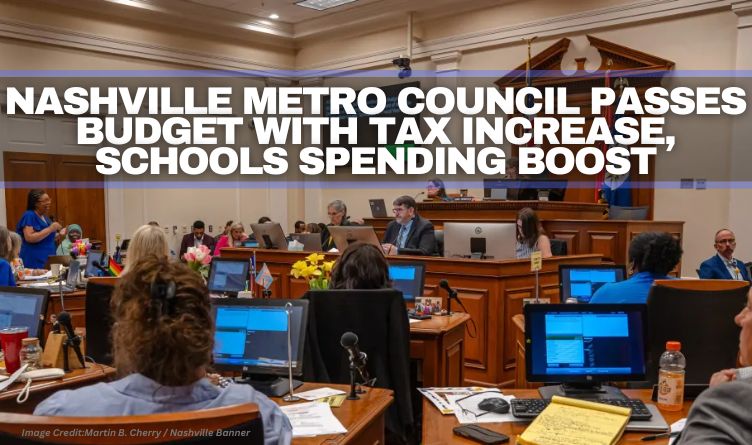Effort to scale back tax increase withdrawn in face of limited support
Image Credit: Martin B. Cherry / Nashville Banner
This story was originally published by the Nashville Banner. Sign up for their newsletter.
By Stephen Elliott, [The Nashville Banner, Creative Commons] –
Faced with three budget proposals for the fiscal year that begins July 1, the Metro Council voted on Tuesday night to implement the one brought by Councilmember Delishia Porterfield, the chair of the Budget and Finance Committee.
Porterfield’s proposal made minor changes to the budget filed by Mayor Freddie O’Connell in May. It maintained the mayor’s proposed tax rate, which represents an average tax increase of 26 percent for homeowners, in addition to most of the more substantial parts of the spending plan. Porterfield’s budget added an additional 1 percent pay increase for city employees on top of the increase in O’Connell’s budget. It made other tweaks, adding support for after-school, emergency food and maternal health programs.
Councilmembers also tacked on amendments to Porterfield’s substitute, further changing the mayor’s budget proposal. Changes made by the council represented about a quarter of a percent of the mayor’s spending plan. Porterfield pulled the money for her changes from administrative and contingency accounts, not departmental allocations.
“I understand the burden on the taxpayer,” Kyonzté Toombs said. “Every year, as the cost of living goes up, the cost of governing goes up, and we have to adjust our revenues where appropriate.”

Councilmember Ginny Welsch withdrew a series of amendments that aimed to redirect funding from the police department to different priorities. Councilmember Burkley Allen withdrew an amendment to redirect funding to the Barnes Housing Trust Fund. Amendments that did pass included funding for a domestic violence gun dispossession detective, the Music City Construction Careers program, the Safe Bar program and Neighbor 2 Neighbor.
The Metro Council heard a second substitute budget, this one from Councilmembers Courtney Johnston, Tonya Hancock and Thom Druffel. It would have instituted a smaller tax increase, but still one representing about 19 percent for homeowners while implementing millions of dollars of reductions to departmental budget increases. The most significant reduction in the substitute was at Metro Nashville Public Schools: It would have removed more than $50 million from MNPS’ allocation while increasing its budget year-over-year. Several other Metro departments, including police, fire, transportation and library, would have seen million-dollar-plus reductions. The alternative budget also would have increased pay even further, by an additional half a percentage point above Porterfield’s version.
Johnston withdrew her substitute proposal, acknowledging that it did not have the support of the body.
“In order to reduce the tax levy, we have to reduce spending,” Johnston said, calling departments’ claims that her reductions would result in reduced services and headcounts “fearmongering and falsities.”
Even some more conservative councilmembers didn’t get behind the second substitute, citing estimates that taxpayers would save less than $15 per month in exchange for the reductions to key departments.
“It doesn’t cut enough to impact the quality of your life,” Councilmember David Benton wrote to constituents this week.
Opponents of the tax increase did not speak during the budget public hearing earlier this month, but during Tuesday’s regular public comment session, Jason Weakley, chair of the Davidson County Republican Party, said he and the party’s executive committee opposed the mayor’s and Porterfield’s budget plans. Weakley said the tax increase “will resonate with your constituents.”

Both the approved budget and the mayor’s initial proposal include $3.8 billion in spending, with a 13 percent increase for Metro Nashville Public Schools and other new spending for what the mayor described in his State of Metro address as schools, services and safety. The Nashville People’s Budget Coalition, which brought several members to the budget public hearing earlier in June, celebrated the substitute budget’s inclusion of $100,000 “to explore additional public-private housing partnerships,” a nod to their social housing proposal.
The body ultimately voted 32-6 in favor of Porterfield’s substitute budget. A no vote on the substitute was primarily symbolic, as failure to pass a council-led budget would mean the mayor’s proposal with the same tax rate would go into effect. Councilmembers Joy Kimbrough, Tonya Hancock, Jennifer Webb, Jeff Eslick, Courtney Johnston and Jason Spain voted against the substitute. Councilmembers David Benton and Thom Druffel abstained.
“I’m grateful for the thoughtful work of Chair Porterfield and the Metro Council in passing a fiscally responsible budget that improves the core government services we all rely on,” O’Connell said in a Tuesday night statement.
The rest
Though much of Tuesday’s meeting was focused on the budget, the council had a full agenda to attend to. Most of it was passed as part of the consent agenda. See the Banner’s meeting preview for a rundown of the legislation on the docket. Consideration of one bill covered in the preview, which would merge the downtown and Gulch business improvement districts, was deferred for one meeting by its sponsor.



